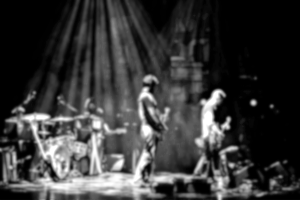“Ever Since I Lost My Mind is very personal. This collection of songs came together over the course of a couple of years, and they all represent different moments,” he says. “It felt cathartic writing all of them, and they were also all fun in different ways.”
With a rock-rooted sound that doesn’t shy away from radio-ready hooks, SUSTO keeps listeners engaged by refusing to occupy an easily defined space. Produced by Ian Fitchuck (Kacey Musgraves, Ruston Kelly) and featuring key input from Osborne’s longtime creative sounding board Wolfgang Zimmerman, Ever Since I Lost My Mind defiantly experiments with synth embellishments, Latin heart, guileless folk, and more. Osborne’s mellow vocals comfort without losing the ability to surprise––delicate croons, growls, and occasional screams take turns.
When Osborne moved to Havana as part of a study abroad opportunity, he thought he was abandoning music for anthropology. But the Cuban musicians and artists he befriended had other ideas. They were among the first to see that SUSTO––and the music that would ultimately fuel it––captured him too well to remain an afterthought. Re-energized, he returned to the States half a year later and recorded SUSTO’s first album. Just after the release of the band’s self-titled debut album, Osborne faced a clear choice. “It was a weird moment. I just had to finally quit keeping one foot out of music and dive in. So, I got knuckle tattoos and haven’t stopped trying to make this work since then,” he says with a laugh. SUSTO’s acclaimed sophomore album & I’m Fine Today made it even more clear that music and Osborne were meant to be.
In Latin American cultures, the word susto describes an intense fear understood as a condition of the soul––an ongoing, spiritual panic attack. All of the letters of susto also appear in Osborne’s full name. “SUSTO was this combination of phonetics and meaning––it felt like me, like a name for myself,” he says. “I chose the name SUSTO for the project because the meaning behind the word––that deep fright––was something I was experiencing, and songwriting felt like it was helping me cure it by helping me to process what was happening. Personally, it was a time of so many powerful transitions: abandoning my religion, losing touch with my family, and just having a general sense of being lost, without direction.”



Share With Friends